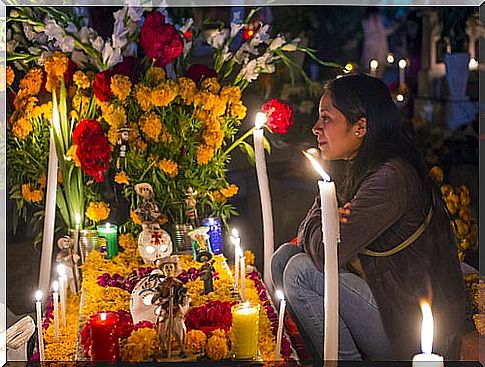The Negative Vision Of Death
We have moved away from the foundations of our biological existence, which has caused the reality of death to be hidden and people to think about it with fear

Death supposes the cessation of existence. This generates great uncertainty and, therefore, great fear. For this reason, the perspective that is usually had of death is negative. From a psychological point of view, ideas are influenced, to a great extent, by anxiety.
To face it, there are various positions that can be divided into three broad categories: scientific, psychological and spiritual. However, these explanations are not a definitive answer.
Often times, the vision of death is negative because they have had a very difficult experience of grief to overcome. The pain of loss hinders your positive vision . It does not matter how many times it is explained that this is part of the life cycle.
Next, we tell more about it, step by step.
Why do we fear death?

It is logical to fear death because we are biological beings whose main purpose is to survive. Even other animals or insects have defense and escape mechanisms to try and escape from it.
In the case of human beings, the matter is more complex. Historically, death has been a subject of greater or lesser recurrence depending on its treatment. In ancient times, for example, it was a very common theme. Therefore, you learned to approach it in a much more natural way.
Today, and especially in the West, we have moved away from the foundations of our biological existence, which has caused the reality of death to be hidden and people to think about it with fear.
Questions like: What happens after death? Where are we going? They are some of the most frequent when it comes to addressing the subject. They have a double effect: on the one hand they can serve to reduce anxiety and on the other, they can increase it. It all depends on the perspective and the circumstances.
The cause determines the vision of death
Some observations indicate that many terminally ill people can become very positive. By focusing their attention on enjoying the moment and what they have, they are said to be able to accept death as natural and necessary in the cycle of life.
Dying violently is certainly something regrettable and terrible, but dying does not always imply suffering. Terminal patients come to confess that dying supposes the cessation of their struggle and the maintenance of a poor quality of life. Seen this way, death does not necessarily have to be something negative.
It is not the same to experience a sudden death than to die burned, drowned or in the middle of a violent situation. Each process can generate different feelings and emotions about the end of life.
Who can be most afraid of dying?

It depends on the psychological factors and the circumstances. For example, people with children, or those who have not achieved their personal goals and who have high expectations for the future, may feel more fearful than other people.
For their part, controlling personalities are more vulnerable. These people tend to develop a great fear of the idea of dying called: tanaphobia. From a psychological point of view, his aversion is due to the lack of control that one has when dying.
When do you want to die?
Those who have had a long and difficult illness want their suffering to end. For this reason, they give up medical assistance, eating and drinking. In this way, your senses will soon start to fail and this will hasten your death.
Much remains to be studied and it is not known for sure whether they themselves generate the process as if it were euthanasia. It is also said that their own bodies stop asking for the nutrients necessary for the body to function.
Amazing testimonials

The testimonies of patients who have lived Near Death Experiences (NDE) during a period of clinical death are also known. They claim to have had extraordinary sensations on the threshold of death, usually mostly visual.
Within these sensations is the typical image of the dark tunnel that seems to end in a zone of light. Fortunately, many of those who say they live this experience conclude that it is a refreshing, sobering and calming sensation.
Sam Parnia, director of the resuscitation center at the University of Medicine in New York, and his team collected data from near-death experiences of about 2,000 people. They affirmed that the way in which each individual interprets these experiences depends entirely on their beliefs and experiences.
Overcoming the fear of death
The first thing is to understand the end of life for what it really is. A natural process that we know could happen from a young age.
There are religions and philosophical positions that understand death as one more cycle or, even, as the continuation towards another plane or stage of life. The truth is that fear of death can paralyze us and push us to stop living thousands of experiences that can be wonderful.









